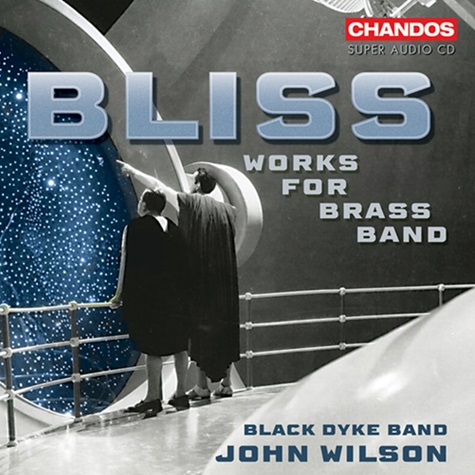

Black Dyke Band
Conductor: John Wilson
Chandos Recordings: CHSA 5344
There is a defined aesthetic to the music of Arthur Bliss – one arguably influenced throughout his life by the effects of war.
Following his ‘Colour Symphony’ (1922), the experiences of trench conflict and the loss of his younger brother had seen the early “tearaway” finally transition from juvenile Viennese School experimenter to become a composer “given rein to its less and less inhibited promptings”.
Introspection
By the Second World War, he was viewed as Elgar’s “natural successor to the Romantic”: The modernist had become a traditionalist, although still one, frustrated in isolation in the USA far from the crucible of the European conflict, deeply troubled by introspection and self-worth.
His return to Britain in 1944 brought welcome acclaim, soon becoming a pillar of the establishment. Knighted in 1950, Bliss was appointed Master of the Queen’s Music in 1953.
However, on receiving the Gold Medal from the Royal Philharmonic Society in 1963 he said that he did not “upbraid Fate for not having given me greater gifts”.
Lasting tensions
John Wilson highlights the lasting tensions of those dichotomies on this superbly produced release; one marked by a deep, lucid understanding of the man and his music. The subtle authority is further enhanced by a hugely responsive Black Dyke Band.
His film and ballet scores unfold like the pages of a director’s script - the solo and ensemble parts fastened by line and phrase to the external stimuli of their staged surroundings.
His film and ballet scores unfold like the pages of a director’s script - the solo and ensemble parts fastened by line and phrase to the external stimuli of their staged surroundings.
Bliss focuses his lens from the viewer’s perspective - from the dramatic urges of ‘Checkmate’ (played out on McKnight Kauffer’s iconic chess board design) and blank soul of ‘Adam Zero’ (with the stage director also as a character) to the futuristic art décor boldness of the sets on Alexander Korda’s ‘Things to Come’.
Relentless
In turn Wilson conjures a relentless sense of visceral anxiety in drawing the fates of love and death to their gory conclusion – the ‘Checkmate’ regicide a remorseless piece of Hitchcock pyscho stabbing.
In turn Wilson conjures a relentless sense of visceral anxiety in drawing the fates of love and death to their gory conclusion – the ‘Checkmate’ regicide a remorseless piece of Hitchcock pyscho stabbing.
Although the suite from ‘Adam Zero’ is only a partial seasonal portrait, it completes a concise cycle of life - from virile youth to vanquished old age. ‘Things to Come’ is a delicious mini opera – a slice of Monckton’s ‘Arcadians’ meets Fritz Lang’s ‘Metropolis’ – a light touch illuminating the ominous undertones.
Bliss looks back in time for ‘Kenilworth’ (1936) - a brilliantly concise postcard souvenir celebrating a historical Elizabethan visit (as well as that of the compeer and his wife) yet written like a condensed film score with Wilson directing the camera shots.
The composer revels in establishment circumstance with ‘Welcome the Queen’ (1953) - packing the music with more than a nod of Elgarian imperial optimism to mark a Pathe news reel as the new monarch returns from a visit to her dominions.
Noblesse oblige
And even with the invasive ascension of 1960s television he also brings a sense of noblesse oblige to the ‘Music from The Royal Palaces’ - weaving together the patronage, riches and intrigue found within the stage walls of the great palaces of state for an audience still marked in their reverence to the Queen.
It is ‘Belmont Variations’ that is perhaps the most revealing of Bliss.
Wilson’s sensitive interpretation is built on a series of darkly brooding, at times unsettling foundation variants to reveal Bliss at his most personal and haunted.
What is ostensibly a cultured post war portrait (1962) of the Massachusetts home of his American wife is in retrospect (given the cogent analysis of Prof Stephen Allen) a work reflective of the deeper thoughts of those dual war time experiences – from the wistful waltz to the stately but by no means triumphal close.
Wilson’s sensitive interpretation is built on a series of darkly brooding, at times unsettling foundation variants to reveal Bliss at his most personal and haunted.
Iwan Fox
To purchase: https://www.chandos.net/products/catalogue/CHSA%205344
Play list:
1. Welcome The Queen (F.95): (Bliss arr. Michael Halstenson)
2-4. Kenilworth (F.13): (Bliss)
i. At the Castle Gates
ii. Serenade on the Lake
iii. March: Kenilworth
5. Suite from ‘Adam Zero’ (F.1): (Bliss arr. Dr Robert Childs)
i. Fanfare Overture
ii. Dance of Spring
iii. Approach of Autumn
iv. Dance of Summer
v. Fanfare Coda
10-13. Things to Come (F.131): (Bliss arr. Phillip Littlemore)
i. Ballet for Children
ii. Machines
iii. Reconstruction
iv. March
14-21. The Belmont Variations (F.10): (Bliss arr. Frank Wright)
i. Variation I
ii. Variation II
iii. Variation III
iv. Variation IV
v. Variation V
vi. Variation VI
vii. Finale
22. Music from The Royal Palaces (F.128): (Bliss arr. Michael Halstenson)
i. Queen Victoria’s Call to the Throne
ii. The Ballroom in Buckingham Palace
iii. Jousts of the Knights in Armour
iv. Melodrama: The Murder of Rizzio in Holyrood House
v. The Royal Palace Theme
27-30. Four Dances from ‘Checkmate’ (F.2): (Bliss arranged Eric Ball)
i. Dance of the Four Knights
ii. The Red Knight’s Mazurka
iii. Ceremony of the Red Bishops
iv. Finale: Checkmate









